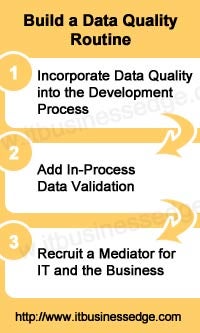
I don’t mean programming routines. I mean the routines your mother tried to create for you. Wake up, make your bed, get dressed, eat breakfast, brush your teeth, comb your hair.
Eventually, this little routine became hard-wired into your brain. It became a habit. That’s what really needs to happen with data quality and data governance: It needs to become part of everyone’s routine, or, if you prefer to be stodgy, part of the work processes.
Yes, you can cleanse your data once a month or once a year — but you won’t see a real payoff for better data unless you’re doing it as part of a work routine, on a daily or weekly basis.
Of course, it takes awhile for routines to pay off, as any follower of the Flylady can tell you. One employee addressing a few discrepancies in one database may not seem like much — but over time, those changes add up.
Recently, I talked with Lance Speck, vice president and general manager of Integration Products at Pervasive Software, about how companies can change work processes to support better data quality and governance.
The first process to change is when your IT development team is building a new system or application, Speck said.
“Most of the time, those things are behind and they’re over budget, so they just say, ‘Well, just dump it all in and we’ll figure it out after the fact, because we have certain MBOs based on launching this thing on time,’” he said.
But we all know what happens: It never gets addressed and the problem just multiples through consecutive releases.
That’s why it needs to be incorporated into the development process, rather than added (or neglected) as an afterthought.
“If we can help them get in front of that and tell them how important it is and how much it’ll save them over time, then that’s big,” Speck said.
It’s not just about changing IT tasks, of course. The business has to incorporate data quality and data governance into their work routines as well.
Of course, they may not want to, because let’s face it: These things do add time to already full work schedules. But Speck thinks it’ll be an easier conversation today than in the past.
“You have to get everybody together and agree that it’s important. Then get a mediator. It’s usually somebody in IT or a panel of the business owners from different departments who agree that it’s a big enough problem where they may have to make some concessions,” he said. “That’s also hard, but the pain has gotten so bad that I believe people are actually willing to come to the table and figure out a way to fix it.
To learn more about the three processes that will help your organization support data quality, check out my full interview with Speck, “Want Better Data? Add Quality Checks to Work Routines.”


